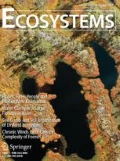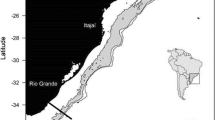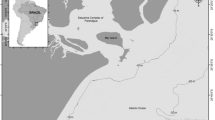Abstract
The increased exploitation of pelagic sharks by longline fisheries raised questions about changes in the food webs that include sharks as apex predators. We used a version of Ecopath/Ecosim models to evaluate changes in trophic interactions due to shark exploitation in the Central North Pacific. Fisheries targeted on blue sharks tend to produce compensatory responses that favor other shark species and billfishes, but they have only modest effects on the majority of food web components. Modest levels of intraguild predation (adult sharks that eat juvenile sharks) produce strong, nonlinear responses in shark populations. In general, analysis of the Central North Pacific model reveals that sharks are not keystone predators, but that increases in longline fisheries can have profound effects on the food webs that support sharks.
Similar content being viewed by others
Author information
Authors and Affiliations
Additional information
Received 19 April 2001; accepted 2 October 2001.
Rights and permissions
About this article
Cite this article
Kitchell, J., Essington, T., Boggs, C. et al. The Role of Sharks and Longline Fisheries in a Pelagic Ecosystem of the Central Pacific. Ecosystems 5, 202–216 (2002). https://doi.org/10.1007/s10021-001-0065-5
Issue Date:
DOI: https://doi.org/10.1007/s10021-001-0065-5




